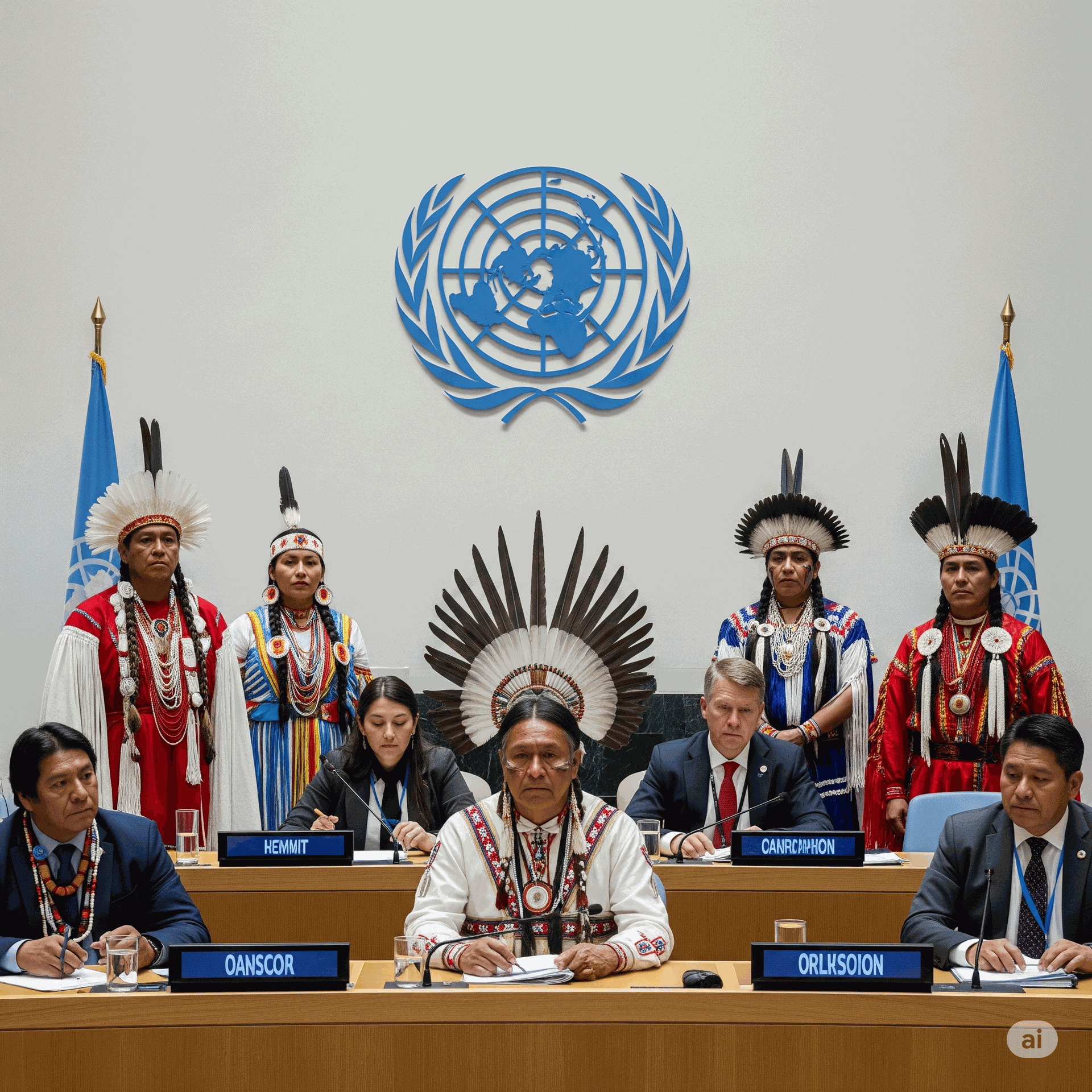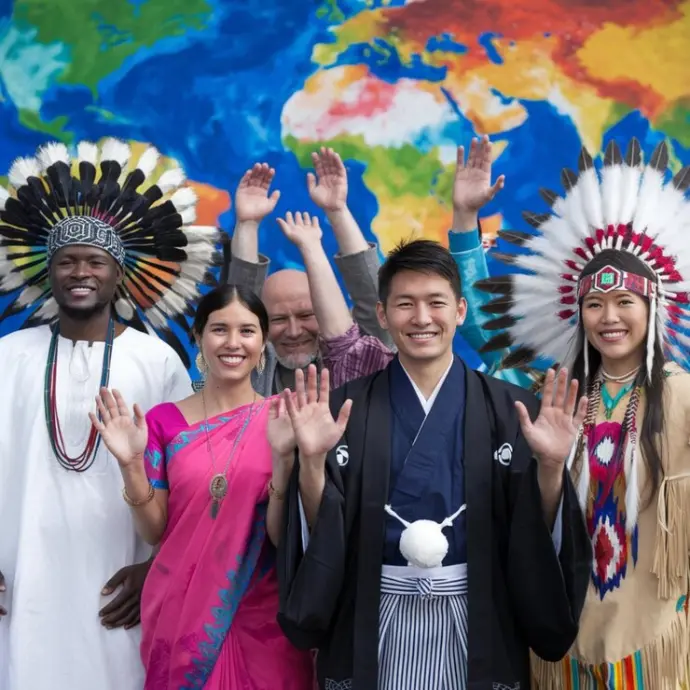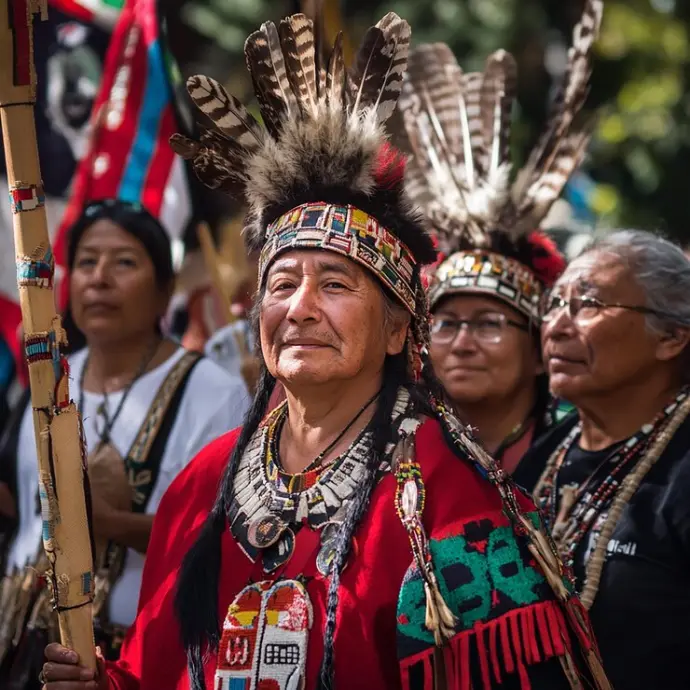The Challenges of Implementing International Agreements on the Rights of Indigenous Peoples

Embark on a fascinating journey that explores the history, art, languages, and contemporary struggles of Indigenous communities in the Americas. In our article "The Challenges of Implementing International Agreements on the Rights of Indigenous Peoples," we examine how the essential rights of these communities are addressed in a global context. Join us in this exploration and learning!
Introduction to the Implementation of International Agreements on the Rights of Indigenous Peoples
The pursuit of international recognition and defense of Indigenous rights has been a constant struggle throughout history. For centuries, Indigenous cultures have faced discrimination, exclusion, and the loss of their ancestral lands. However, since the 20th century, significant progress has been made in protecting the rights of Indigenous peoples globally.
One of the most important milestones in the defense of Indigenous rights at the international level was the adoption of the United Nations Declaration on the Rights of Indigenous Peoples in 2007. This declaration recognizes the collective and individual rights of Indigenous peoples, including their right to self-determination, land, territory, and natural resources.
Furthermore, several international conventions and treaties, such as International Labor Organization (ILO) Convention 169 and the Convention on Biological Diversity, have helped strengthen the legal framework for the protection of Indigenous rights worldwide.
Ratification of international treaties addressing the rights of indigenous peoples is vital for the promotion and protection of their rights worldwide. These treaties not only highlight the need to preserve the cultures, languages, and traditions of indigenous communities, but also ensure their involvement in decision-making that affects their lives and territories.
The effective implementation of these treaties requires the creation of mechanisms for consultation and free, prior, and informed consent that allow indigenous communities to express their opinions and participate in policies and projects that directly affect them.
Furthermore, the implementation of these treaties entails ensuring that indigenous communities have access to justice, education, healthcare, and other fundamental services, in order to reduce inequalities and improve their quality of life.
Key International Agreements on Indigenous Rights
At the global level, there are multiple agreements and declarations that aim to safeguard and promote the rights of Indigenous peoples around the world. These instruments are vital to fostering justice, equity, and respect for Indigenous communities.
The UNDRIP is a key document adopted by the United Nations General Assembly in 2007. This declaration recognizes and protects both the collective and individual rights of Indigenous peoples, addressing issues such as self-determination, culture, territory, and political participation. Although non-binding, the UNDRIP is considered an international benchmark for the defense of Indigenous rights.
The implementation of the UNDRIP principles requires an active commitment from States to ensure that Indigenous peoples' rights are respected in their laws and practices. This includes conducting prior and informed consultations on decisions that may impact these communities, as well as adopting measures to prevent discrimination and promote equality.
However, the effective implementation of UNDRIP remains a challenge in many countries, where indigenous communities face barriers to accessing their rights and resources.
International Labor Organization (ILO) Convention 169 is the only legally binding international instrument focused on the rights of indigenous and tribal peoples. Adopted in 1989, this convention establishes minimum standards in areas such as consultation, participation, sustainable development, and the protection of cultural identity.
For Convention 169 to be effective, States must adopt concrete policies and measures to ensure respect for and fulfillment of the rights of indigenous peoples at all levels. This includes encouraging the active participation of these communities in decisions that affect them.
Despite its relevance, ratification and implementation of Convention 169 is limited in several countries, representing an obstacle to the protection of Indigenous rights globally.
Adopted in 2016 by the Organization of American States (OAS), the American Declaration seeks to strengthen the protection of the rights of Indigenous peoples in the Americas. This document recognizes the cultural diversity and valuable contribution of Indigenous communities to the region's heritage.
The implementation of this declaration requires a strong commitment from OAS member states to guarantee respect for the territorial, cultural, and political rights of Indigenous peoples. This entails adopting concrete measures to prevent discrimination, promote inclusion, and ensure the active participation of these communities in decision-making.
Despite progress, the full implementation of the American Declaration on the Rights of Indigenous Peoples remains a challenge in several countries in the Americas, where problems persist in the protection and promotion of Indigenous rights.
Challenges in the Implementation of Agreements
One of the most significant challenges in the implementation of international agreements on indigenous rights lies in the legal and political misalignments at the national level. Often, countries' regulatory frameworks are not in line with international standards that protect indigenous peoples. This can generate conflicts and hinder the effective implementation of the rights recognized in international treaties.
Furthermore, differences in the interpretation of laws and policies by governments and indigenous communities can lead to gaps in the protection of these peoples' rights. These discrepancies can complicate the guarantee of free, prior, and informed consultation, as well as the protection of indigenous communities' lands, territories, and natural resources.
To address this challenge, it is essential to promote the alignment of national laws with international human rights standards and strengthen mechanisms for dialogue and collaboration between governments and indigenous communities.
Another significant obstacle to the implementation of international agreements on indigenous rights is the lack of recognition and effective participation of indigenous communities in decision-making processes that directly affect them. Policies and programs designed to protect indigenous rights are often implemented without the consultation or consent of indigenous peoples.
This lack of participation can result in the adoption of inadequate or ineffective measures that do not reflect the needs and aspirations of indigenous communities. Furthermore, the exclusion of indigenous peoples from decision-making spaces can perpetuate the marginalization and discrimination they have historically suffered.
To address this situation, it is crucial to promote the active and meaningful inclusion of indigenous peoples in all phases of the design, implementation, and evaluation of policies and programs that concern them, thus ensuring their full right to self-determination and participation.
Lack of resources and limited international support constitute a considerable challenge in the implementation of international agreements on the rights of indigenous peoples. Many countries lack the financial, technical, and human resources necessary to fulfill their obligations under international treaties regarding the protection of indigenous peoples.
Furthermore, the absence of support and technical assistance from the international community can hinder the training of government officials, raising awareness in civil society, and promoting indigenous rights at the national level. This can limit opportunities to implement effective actions that guarantee the protection and respect of indigenous peoples' rights.
To address this challenge, it is vital to strengthen international cooperation and solidarity in support of indigenous peoples, as well as to mobilize financial and technical resources to facilitate the implementation of international agreements on indigenous rights at the national level.
Case Studies on Effective Implementation
The United Nations Declaration on the Rights of Indigenous Peoples (UNDRIP) is a key international instrument that seeks to protect and promote the rights of Indigenous peoples worldwide. Canada, as a signatory to UNDRIP, has experienced both successes and challenges in its implementation at the national level.
One of the most notable achievements in UNDRIP implementation in Canada has been the creation of a legal framework that recognizes the rights of self-determination and the need for prior consultation with Indigenous communities in decisions that directly affect them. This approach has been instrumental in addressing historical inequalities and improving the relationship between the government and Indigenous peoples.
Despite progress, Canada still faces challenges in fully implementing UNDRIP, particularly in areas such as land ownership, natural resource protection, and the effective participation of Indigenous peoples in national decision-making. However, the continued commitment of the government and Indigenous communities to implementing UNDRIP is an important step toward justice and equity.
International Labor Organization (ILO) Convention 169 is a key instrument for the protection of the rights of Indigenous peoples in Latin America. In Bolivia, significant progress has been made in the implementation and enforcement of this convention for the benefit of its Indigenous communities.
One of the most notable achievements in Bolivia has been the creation of legal and political mechanisms that guarantee the active participation of Indigenous peoples in decision-making that affects their rights and territories. Furthermore, public policies aimed at protecting the culture, language, and traditions of Indigenous communities in the country have been implemented.
Despite these advances, Bolivia still faces challenges in the full implementation of Convention 169, especially in areas such as access to justice, the protection of Indigenous territories, and the fight against discrimination and racism. However, the commitment of the Bolivian government and Indigenous organizations to overcome these challenges is essential to guarantee the full observance of the rights of Indigenous peoples in the country.
The American Declaration on the Rights of Indigenous Peoples is a regional instrument that seeks to protect and promote the rights of Indigenous communities in the Americas. In Mexico, this declaration has had a significant impact on national legislation and the recognition of the rights of Indigenous peoples.
One of the most relevant aspects of the American Declaration's impact in Mexico has been the incorporation of principles such as free, prior, and informed consultation into national legislation, as well as the recognition of the country's pluricultural and ethnic diversity. These advances have been fundamental to strengthening the protection of the territorial and cultural rights of Indigenous communities in Mexico.
However, despite these achievements, Mexico faces challenges in the effective implementation of the American Declaration, especially in areas such as violence against Indigenous human rights defenders, lack of access to justice, and structural discrimination. The commitment of the Mexican government and civil society to address these challenges is crucial to ensuring full respect for the rights of Indigenous peoples in the country.

Strategies to Strengthen the Implementation of Agreements
In the area of Indigenous peoples' rights, one of the most pressing challenges is ensuring the effective compliance of the international agreements that support and promote them. To address this challenge, it is essential to develop strategies that strengthen Indigenous participation in political processes, ensuring that their voices are heard and considered in decisions that directly affect them. Strengthening Indigenous participation in political processes involves creating inclusive spaces where they can express their needs, concerns, and proposals.
This not only contributes to greater legitimacy of the decisions made but also fosters diversity and equity in public policymaking. Free, prior, and informed consultations are a key mechanism in this regard, as they allow Indigenous communities to actively participate in decision-making that impacts their territory and their rights. Furthermore, it is crucial to ensure that political and administrative institutions include Indigenous representatives, promoting diversity and inclusion at all levels of government. It is also necessary to promote the training and empowerment of Indigenous leaders so they can play an active and effective role in political processes, defending their rights and those of their communities.
Education and awareness are fundamental elements to improve the implementation of international agreements on Indigenous rights. It is imperative to invest in educational programs that foster knowledge and respect for the cultures, traditions, and rights of Indigenous peoples, both among the general population and within government institutions and society as a whole.
Raising awareness about Indigenous rights is essential to combat the discrimination, stereotypes, and exclusion that these communities often face. Through awareness-raising campaigns, educational activities, and the dissemination of accurate and up-to-date information, greater understanding and empathy for the realities and challenges that Indigenous peoples face today can be promoted.
Furthermore, it is necessary to include content related to Indigenous history, culture, and rights in educational programs, promoting interculturality and intercultural dialogue as tools for building more just, inclusive, and diversity-respecting societies.
International cooperation and technical support to national governments are key aspects for strengthening the implementation of international agreements on Indigenous rights. Through strategic alliances between different actors, such as international organizations, cooperation agencies, and civil society, technical assistance, resources, and training can be offered to States to ensure compliance with their commitments regarding Indigenous rights.
The exchange of good practices, collaboration in the formulation of inclusive public policies, and support in the implementation of specific programs and projects are some of the ways in which international cooperation can contribute to strengthening the protection of Indigenous rights at the national and global levels.
Furthermore, it is essential to promote dialogue and coordination among the various actors involved in the protection of Indigenous rights, seeking joint and sustainable solutions that guarantee respect for and promotion of the human rights of Indigenous peoples worldwide.

Conclusion: Towards a Future of Inclusion and Defense of Indigenous Rights
The implementation of international agreements on indigenous rights constitutes a fundamental challenge in the protection and respect for indigenous communities globally. To achieve this goal, it is crucial that States demonstrate strong political will and that there be effective international collaboration to ensure compliance with these agreements. Political will not only translates into the creation of laws and policies that safeguard the rights of indigenous peoples, but also into the allocation of adequate resources for their implementation and monitoring. Furthermore, it is essential that this will be translated into concrete actions that improve the living conditions of indigenous communities and promote their active participation in the decisions that affect them. Furthermore, international collaboration is key to addressing the challenges these communities face, as many of them transcend national borders. It is necessary to establish cooperation mechanisms between countries, international organizations, and Indigenous communities to effectively address issues such as the protection of their territories, languages, and cultures, as well as the fight against discrimination and violence they suffer.
The political will of States is essential to ensuring the protection of Indigenous rights. This will is manifested in the adoption of laws and policies that recognize and respect the rights of these communities, as well as in the allocation of sufficient resources for their implementation. It is also reflected in the promotion of the active participation of Indigenous peoples in decision-making processes that concern them.
Furthermore, international collaboration is essential to address the global challenges affecting Indigenous communities. Through partnerships between countries, international organizations, and Indigenous communities, coordinated actions can be carried out to guarantee respect for their rights and the protection of their territories and natural resources.
Political will and international collaboration are key elements in the implementation of agreements on Indigenous rights.
Only through a strong commitment from States and effective cooperation at the global level can we move toward a future in which Indigenous communities' rights are fully recognized, respected, and protected.
The future for Indigenous communities and global society requires a joint and coordinated effort to ensure the effective implementation of international agreements on Indigenous rights. This includes the need to strengthen mechanisms for monitoring and enforcing these agreements, as well as to encourage the active participation of Indigenous communities in decision-making processes that affect them.
Furthermore, it is essential to raise awareness in society about the importance of respecting and protecting Indigenous rights, as well as valuing and preserving the cultural wealth and ancestral knowledge of these communities. Only through an inclusive and respectful approach can we build a future in which Indigenous communities live with dignity and are fully recognized in their rights.
In short, the future for Indigenous communities and global society is a challenge that demands a firm commitment, effective collaboration, and profound respect for the cultural diversity and wealth of Indigenous peoples. Only through a joint and sustained effort can we move toward a world that is more just, equitable, and respectful of the rights of all human beings.

 IHRO NEWS
IHRO NEWS